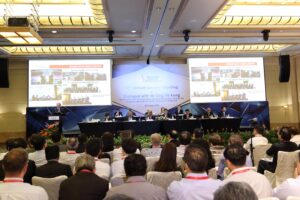Holding Annual General Meetings (AGMs) For Your Company
What is an Annual General Meeting (AGM)?

Annual General Meetings (AGMs) are compulsory annual meetings that all Singapore companies need to hold. The primary purpose is to update the shareholders of the company on the business or financial health. Financial statements are presented to the shareholders and they can raise any questions that they may have on the company’s performance to the board of directors.
The shareholders vote on important business decisions as well, for example, to remove an existing director or to appoint a new director.
*Note: This article applies to companies that their financial year-end (FYE) ends on 31 August 2018 and beyond.
Deadlines for a company to hold its AGM

Unless exempted, private companies must hold their Annual General Meetings within six (6) months after their FYE. For public companies will be within four (4) months after FYE.
For companies incorporated before 31 August 2018, the FYE date is assumed as the anniversary of the FYE date notified to Registrar previously, if not, the FYE date will be assumed to be the anniversary of the company’s incorporation date.
Matters of discussion during AGM
Most of the time, your corporate secretarial service firm will prepare all the documents needed for you to hold your AGM. One such document is the company’s constitution. Profit and loss account (P&L) will be presented during AGM for the financial year as well. Examples of other matters to be discussed will be the re-appointment of directors and auditors, dividend declaration, director fees. Shareholders may raise any questions that they have as well for the board of directors.
Notice of AGM

A written notice indicating the date, time, and venue of AGM, the agenda and matters to be discussed, shareholder’s right to appoint a proxy, has to be given and circulated to the members at least 14 days prior. A copy of the director’s and auditor’s report, financial statements, the balance sheet should be prepared and sent to the members before the AGM.
Exemptions from AGM
If private companies send their financial statements to their members within five (5) months from the company’s FYE, they may be exempted from holding Annual General Meetings. Dormant private companies are exempted from holding Annual General Meetings as well as exempted from preparing financial statements.
An exemption is subjected to the following conditions:
- Shareholders can notify the company and request for AGM to be held. Notice is to be given to the company after its FYE, within fourteen (14) days, by the end of the sixth (6th) month.
- The company can request a time extension from the Accounting and Corporate Regulatory Authority (ACRA), subject to approval. The AGM must be held within six (6) months after FYE according to the shareholder’s request.
- If any of the shareholders or auditors request for reporting of the financial statements, an AGM must be held no later than fourteen (14) days after sending out the financial statements.
Dispensing with holding an AGM
A private company may dispense with holding an AGM by way of a resolution under section 175A of the Companies Act. Provided that the resolution has been passed by all shareholders of the company, whether in person or through their proxies.
There are still obligations to be fulfilled after doing away with the need for an AGM:
- Financial statements to be prepared at each FYE
- Financial statements and other company reports such as Director’s report to be sent to all shareholders
- AGM-related resolutions that are passed to be circulated
Do note that a shareholder may still be able to request for AGM to be held, so long as such a request is made within 14 days, before the sixth (6th) month dateline from the FYE. If there are at least three (3) months left to the AGM deadline, and such resolution has ceased its effect, an AGM must still be held.
Appointing a proxy for AGM

A proxy form has to be accompanied by the notice of AGM as mentioned earlier. In such an event that a shareholder is unable to turn up for an AGM, he or she may appoint a proxy to attend the AGM on his or her behalf, according to section 181 of the Companies Act. A maximum of two (2) proxies may be appointed to attend the same AGM. The proxy can be anyone so long as he or she is appointed by the shareholder, and he or she does not have to be a shareholder of the company.
Failure to meet the AGM deadline
As mentioned earlier, it is possible for companies to apply to ACRA for a time extension before the deadline, subject to ACRA’s approval. It can be done by any of the company’s officers such as the director or the corporate secretary. For public companies, they will have to provide reasons for the time extension request, with supporting documents and comments from SGX for the application.
The time needed for approval of an extension of time is generally up to fourteen (14) days and may take up to thirty (30) days if more clarifications are needed.
One such reason is a change in the company’s FYE date. It is necessary that you apply for the change in FYE date first, before applying for a time extension of AGM. If you are unsure about the steps, you may contact us or your corporate secretary to advise you further.
Post AGM
The AGM meeting minutes must be in writing and signed by the chairman of that meeting. After that, the company will file its Annual Returns.
The company will be required to verify the following upon filing of Annual Returns:
- Company’s name and registration number
- Registered address
- Principal activities
- Company type i.e. private or public listed company
- Summary of issued and paid-up share capital
- Registered charges
- Information of directors, company secretary, auditors, and shareholders
- The financial period which audited accounts are made up to
- Accounts in XBRL format
Penalties for the failure to hold an AGM
ACRA will impose penalties for non-compliance. Companies and every director may be given a chance to compound the offence by paying a composition sum of Singapore Dollars $300 per breach. Late lodgement fee shall be imposed as well for each return that is filed late.
ACRA may prosecute the company’s directors in Singapore Courts for failure to register and attend the Directors Compliance Program (DCP) offer by ACRA to first-time offenders. Failure to compound the offence when given a chance to will also lead to prosecution by ACRA, or in more serious cases, ACRA may not be willing to such offenders compound the offence.
A 3-tier composition fine for failure to hold an AGM is as such:
Tier 1: ACRA has the discretion to offer a composition fine of Singapore Dollars (SGD) $300 per breach before a summon is issued.
Tier 2: ACRA has the discretion to offer a composition fine of SGD $600 per breach after the summons is issued.
Tier 3: After a Warrant of Arrest is issued, ACRA has the discretion to offer a composition fine of SGD $900 per breach.
You may contact us if you have any questions or require assistance in preparing for AGMs.
Download the Telegram app and follow us for the latest updates: https://t.me/sgcompanyservices
